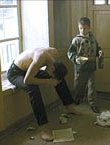 SHADOWS ARTHOUSE FILMS ’04
SHADOWS ARTHOUSE FILMS ’04On this page: ANGEL ON THE RIGHT | THE FLOWER OF EVIL | JU-ON: THE GRUDGE
KONTROLL | PARADISE IS SOMEWHERE ELSE
< < M O R E | M O R E > >
More mainstream art films have their own pages.
Other offbeat films are at: SHADOWS FILM FESTIVAL | SHORT FILMS
last update
14.Jul.04
 ANGEL ON THE RIGHT
ANGEL ON THE RIGHT

|
dir-scr Djamshed Usmonov with Maruf Pulodzoda, Uktamoi Miyasarova, Kova Tilavpur, Malohat Maqsumova, Mardonqul Qulbobo, Orzuqul Kholikov, Furkat Buriev, Hokim Rakhmonov, Tolib Temuraliev, Davras Azimov release release UK 20.Aug.04 • 02/Tajikistan 1h29  REVIEW BY RICH CLINE |
Hamro (Pulodzoda) returns from a 10-year prison term in Russia to start over again. Back home he discovers that his mother (Miyasarova) is ill, and he decides to fix up the house so he can sell it and pay for her funeral. But his mother is only play-acting; she wants the house fixed up for very different reasons. And everyone else in the village soon has their claws into Hamro as well--from the town's mayor (Qulbobo) to a sexy nurse (Maqsumova) and the 11-year-old son (Tilavpur) he never knew he had. It seems that life here is even harder than in mafia-run Russia!
 The title comes from an old Islamic fable about the two angels of conscience sitting on our shoulders--the one on the left notes all our bad thoughts and deeds while the one on the right notes the good, and it's all weighed up on Judgement Day. Yes, the film is about trying to plot a sensible course in a chaotic world--sorting out true motives from manipulative ones, attempting to do the right thing for a change, even after a life of vice. This is a deceptively simple idea, and the film is also deceptively simple; complex ideas gurgle continuously under the surface as characters' motives come to light in surprisingly tricky ways.
The title comes from an old Islamic fable about the two angels of conscience sitting on our shoulders--the one on the left notes all our bad thoughts and deeds while the one on the right notes the good, and it's all weighed up on Judgement Day. Yes, the film is about trying to plot a sensible course in a chaotic world--sorting out true motives from manipulative ones, attempting to do the right thing for a change, even after a life of vice. This is a deceptively simple idea, and the film is also deceptively simple; complex ideas gurgle continuously under the surface as characters' motives come to light in surprisingly tricky ways.
Writer-director Usmonov captures this universal theme beautifully in his complex and blackly funny story. There are little touches on every side that add insight into the culture. And the extremely well-played characters are dryly funny as they all go about their little plans, mixing honest attempts to earn a living with devious underhanded schemes to make money on the side. No one is above reproach here (except perhaps the nurse and the little boy), and this gives the film a tone that's both sharply observant and easy to identify with. If we're honest with ourselves. [12 themes, violence, innuendo] 14.Jul.04
 THE FLOWER OF EVIL [La Fleur du Mal]
THE FLOWER OF EVIL [La Fleur du Mal]

|
dir-scr Claude Chabrol with Benoit Magimel, Nathalie Baye, Melanie Doutey, Suzanne Flon, Bernard Le Coq, Thomas Chabrol, Michele Dascain, Dominique Pivain, Caroline Baehr, Francoise Bertin, Didier Benureau, Yvon Crenn release France 19.Feb.03, USA 3.Oct.03, UK 2.Jul.04 • Canal+ 03/France 1h44  REVIEW BY RICH CLINE |
Francois (Magimel) has just returned home to France after four years in America, and his family is just as screwy as he remembered. While his stepmother (Baye) is running for mayor, someone is digging for dirt and discovering skeletons in the family closets. And there are plenty of them to find, from his aunt's (Flon) dark wartime secrets to his father's (Le Coq) womanising ... to Francois' own budding romance with his cousin/stepsister Michele (Doutey)! But to the Charpin-Vasseur family this is nothing remotely unusual.
 Chabrol is clearly having a great time skewering the narrow-minded, insular lives of the French upper classes. He's fairly ruthless in his approach, presenting everything matter-of-factly, from their petty prejudice to their deep-seated ignorance (the conversations about America are mind-boggling). This plays out in a jumbled series of scenes that never really form an overall narrative. It's more a string of revelations and memories that slowly bring to light the family's murky past while they reach for even more power and influence.
Chabrol is clearly having a great time skewering the narrow-minded, insular lives of the French upper classes. He's fairly ruthless in his approach, presenting everything matter-of-factly, from their petty prejudice to their deep-seated ignorance (the conversations about America are mind-boggling). This plays out in a jumbled series of scenes that never really form an overall narrative. It's more a string of revelations and memories that slowly bring to light the family's murky past while they reach for even more power and influence.
The cast play it in the same straightforward style--believable and often surprisingly likeable, even though every character is blissfully up to no good. These are people who simply don't have an internal moral compass--well, if they do, it's certainly not pointing to magnetic north! We can laugh at them, we can be shocked at what they're capable of, and we can recognise moments of truth in them as well. But we never care about anyone, so the film remains icy and aloof. There's a solid message here about wealth and hypocrisy, but it's watered down by the opaque storytelling. What really makes it worth watching are Baye's expressively energetic face and Chabrol's complex camera acrobatics. [15 themes, language, brief violence] 19.Jun.04
 JU-ON: THE GRUDGE
JU-ON: THE GRUDGE

|
dir-scr Takashi Shimizu with Megumi Okina, Misaki Ito, Misa Uehara, Yoji Tanaka, Takako Fuji, Yuya Ozeki, Hirokazu Inoue, Kayoko Shibata, Yui Ichikawa, Yukako Kukuri, Kanji Tsuda, Shuri Matsuda release Japan 25.Jan.03, UK 2.Jul.04, US 23.Jul.04 • 03/Japan 1h32  REVIEW BY RICH CLINE • See also: THE GRUDGE [2004] | JU-ON: THE GRUDGE 2 [2003] |
 Shimizu packs the film with images and sequences that are specifically designed to creep us out: eerie music, creaks and scratching, general untidiness, black cats and a sinister use of light and shadow. There are also rather a lot of things that feel lifted directly from The Ring, including the use of videotape, photos and television, unnatural children and women with hair hanging in their faces. The result is indeed unsettling, but it's also fragmented and repetitive, and badly overacted by the almost hilariously bug-eyed cast.
Shimizu packs the film with images and sequences that are specifically designed to creep us out: eerie music, creaks and scratching, general untidiness, black cats and a sinister use of light and shadow. There are also rather a lot of things that feel lifted directly from The Ring, including the use of videotape, photos and television, unnatural children and women with hair hanging in their faces. The result is indeed unsettling, but it's also fragmented and repetitive, and badly overacted by the almost hilariously bug-eyed cast.
On the other hand, the notion that evil can spread like a virus is a very clever one. It's all about how our anger lives on after we die, infecting people and places that encounter it. This concept makes the film intriguingly creepy, even though it never builds up any overall tension as it shifts from one story to the next--there's no general narrative drive, no real mystery to solve, no deadline to race toward, no urgency and, frankly, no hope!
By the way, this is Shimizu's third of five films about this mythology--the first two were made for video, then this one and its sequel, and now an American version due out later this year. All feature the same mother-son characters played by Fuji and Ozeki. [15 themes, violence, suspense] 18.Jun.04
 KONTROLL
KONTROLL

|
dir-scr Nimrod Antal with Sandor Csanyi, Zoltan Mucsi, Zsolt Nagy, Csaba Pindroch, Sandor Badar, Eszter Balla, Lajos Kovacs, Balazs Mihalyfi, Bence Matyassy, Zsolt Laszlo, Peter Scherer, Gyorgy Cserhalmi release Hungary 20.Nov.03, UK 17.Sep.04, US 1.Apr.05 • 03/Hungary 1h45  REVIEW BY RICH CLINE |
 Writer-director Antal creates a terrific atmosphere; the entire story takes place underground, and the cinematography captures the claustrophobic tunnels and strangely expansive stations, everything in a sooty state of disrepair ... like the characters themselves. Csanyi is a magnetic presence at the centre, even though he's beaten to a pulp as the story progresses. And around him each actor creates someone engaging--bundles of amusing quirks and mysterious back-stories (honestly, who would take this job?).
Writer-director Antal creates a terrific atmosphere; the entire story takes place underground, and the cinematography captures the claustrophobic tunnels and strangely expansive stations, everything in a sooty state of disrepair ... like the characters themselves. Csanyi is a magnetic presence at the centre, even though he's beaten to a pulp as the story progresses. And around him each actor creates someone engaging--bundles of amusing quirks and mysterious back-stories (honestly, who would take this job?).
The whole film has an otherworldly feel. These are like cavemen, reduced to the most primitive behaviour by overwhelming job stresses. Amid this, Antal brings out the workers' dry, acerbic humour--camaraderie that's both good-natured and a little too competitive, and a company structure that resembles the Third Reich. These people are control freaks--little men given too much power in their subterranean world! And despite the grim surroundings and frequent outbreaks of violence, this pathetic top-secret police force wins us over with raw honest charm and a hilarious matter-of-fact outlook on life. As for the murderous subplot, it's only there to highlight Bulcsu's much more personal journey, which transforms the film into an allegory about one man's voyage through a dark period in his life. And this subtext is what makes the film so much better than the inevitable American remake, which'll probably star Will Ferrell. [15 themes, language, vulgarity, violence] 9.Jul.04
 PARADISE IS SOMEWHERE ELSE
PARADISE IS SOMEWHERE ELSE

|
dir-scr Abdolrasoul Golbon with Yar-Mohammad Damanipour, Jan-Mohammad Tajik, Fereshteh Sarabandi, Mohammad Hamzehzadeh, Mohammad Medi Keykhadi release UK 23.Jul.04 • 03/Iran 1h17  REVIEW BY RICH CLINE |
Writer-director Golbon captures the bleak landscape effortlessly--dusty barrenness stretches to jagged hills, while filthy sheep wander the roads and the factory belches soot into the sky. We can almost taste the dirt! And the characters are perfectly set in this time and place; they're a mixture of brazen, stubborn, ambitious people who have awkward ties to the old traditions, strong social pressures and an almost debilitating tension between local morality and the nation's rule of law. The cast brings these people to life very well, and their interaction feels raw and authentic.
The film has an episodic structure that feels like an assembly of short, almost disconnected scenes. As a result, Golbon struggles to generate an overall tone. Some sequences are lovely (such as a scene at the river where Eidok and Gol-Mohammed swim and bathe the sheep), while others are rough and far too exposition-heavy for such a minimalist plot. And as the narrative progresses, the filmmaker wrings out a bit too much irony from Eidok's personal journey. This leaves it fairly contrived and preachy, but you don't mind so much when a film takes you somewhere you've never been before and shows us that things are essentially the same everywhere: Teens just want to get away from home; paradise certainly must be somewhere else! Then we grow up and realise we never had it so good. [PG adult themes] 18.Jun.04
